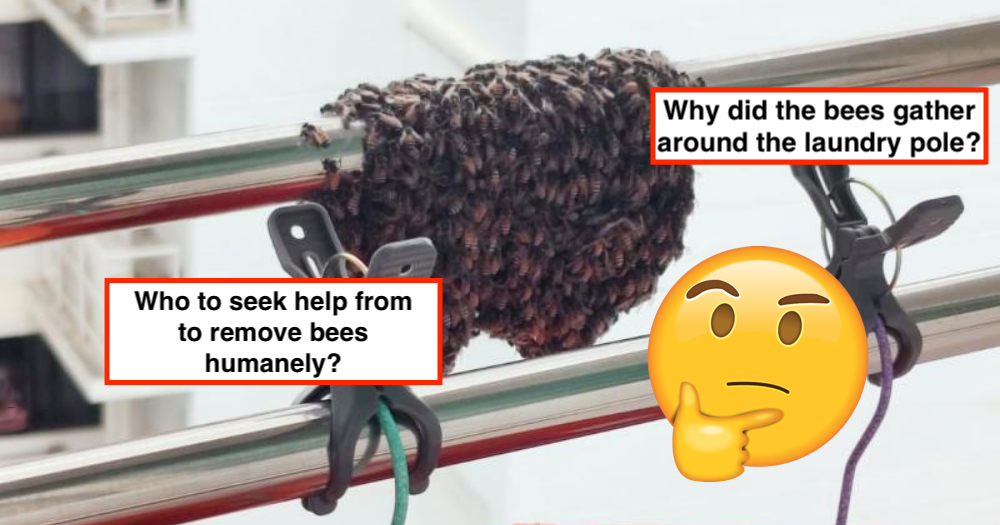Follow us on Telegram for the latest updates: https://t.me/mothershipsg
As Singapore strives to become a City in Nature, it will be crucial for residents to learn how to coexist with wildlife of any kind.
That means learning more about wild creatures' behaviours and not killing them unnecessarily.
A resident in Punggol, surnamed Lin, was surprised by the sight of bees gathering on his laundry pole recently.
The 32-year-old who resides in a unit on the 15th level told Shin Min Daily News (SMDN) that it was his first encounter with bees at home since he moved into the estate a year ago.
As the number of bees gradually increased, he was concerned that the "bee swarm" would fall onto the playground, causing harm to children.
The town council was contacted and the bees were exterminated by a pest control company subsequently.
What happened at Lin's house may sound rather bizarre and you might wonder: Why were the bees gathering around the laundry pole randomly?
Bees were moving 'house' aka swarming
A local beekeeper from Bee AMAZED garden, John Chong, explained to Mothership that the bees surrounding the laundry pole were likely in transit to a new location as part of a natural process known as swarming.
During this period, a large group of bees would leave their hive to scout for potential locations that are suitable to establish a new colony before reproduction.
A handful of male drone bees and countless female worker bees form the swarm around the queen bee temporarily. Ranging anywhere between several hundred to a few thousand, the bees follow the queen to keep her safe.
While waiting for the scout bees to find the new spot, the bee swarm may occasionally cluster on a tree limb, shrub or, in Lin's case, his laundry pole to rest.
Depending on the weather and the time scouting bees require to find a new location, clusters can exist for as little as an hour to as long as several days.
Once a suitable location has been identified, the swarming bees depart and the cluster disperses.
"They got tired and needed to rest. After resting, they will fly away. If Mr Lin had not panicked and waited just a few hours, perhaps the bees would have flown off on their own to their new location. Sadly, they were not given a chance to do so," Chong told Mothership.
Least aggressive when swarming
Chong added that bees are least aggressive and less likely to sting during this period.
Why? Because they are too preoccupied with their relocation to form a new colony.
When in transit, the bees carry loads of honey needed to make new honey combs.
"When they swarm, they are more concerned in going to their new location to form a new colony. They carry with them loads of honey needed to make new honey combs. As such, they are not interested in stinging. If they sting, they die. They are more concerned about living and making new honey combs," Chong explained.
Yes, a honey bee dies if it stings a person. After puncturing human skin, it cannot pull its stinger out without tearing its lower abdomen apart. As the bee tries to escape after stinging a person, it will inevitably pull out its venom sac, digestive tract and muscles, resulting in death.
Bees are not pests
While many people are fearful of bees, bees are not pests.
Instead, they are important pollinators of plants and predators of other invertebrates.
What to do around bees?
If you see a hive in the park, keep your distance to refrain from provoking the bees and inform NParks of the hive by calling their hotline 1800-471-7300.
If you encounter a swarm at home, remain calm and do not attempt to remove the cluster.
Should you want to remove the cluster, Anbarasi Boopal, the Co-CEO (Advocacy) at Animal Concerns Research and Education Society (Acres), recommends enlisting the assistance of beekeepers in Singapore who will remove the bees in a humane manner.
Boopal told Mothership that Acres does not handle bees.
3 beekeepers in Singapore who can help remove bees humanely
Here are three beekeepers with bee removal services in Singapore:
1. Xavier Tan from Nutrinests (9147 4065)
2. John Chong from BEE AMAZED Garden (9669 6370)3. Clarence Chua from The Sundowner
https://www.instagram.com/p/CLXzAmRH6u3/
These beekeepers can help provide useful advice and remove bees or beehives in a humane manner.
Some also regularly conduct events and workshops that educate the public about the importance of bees in our ecosystem, which you should definitely check them out when you are free.
Top image adapted via photo from Shin Min Daily News
If you like what you read, follow us on Facebook, Instagram, Twitter and Telegram to get the latest updates.

